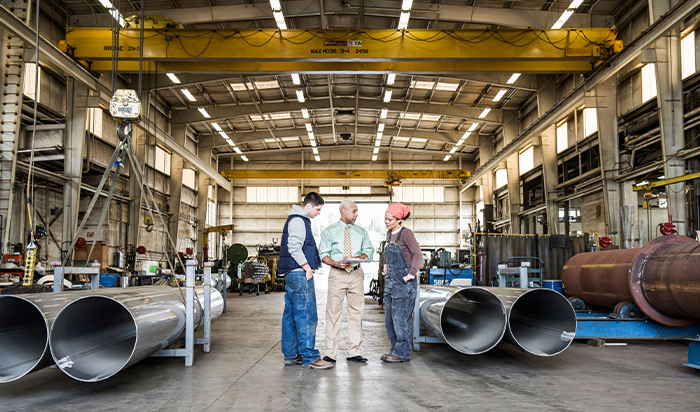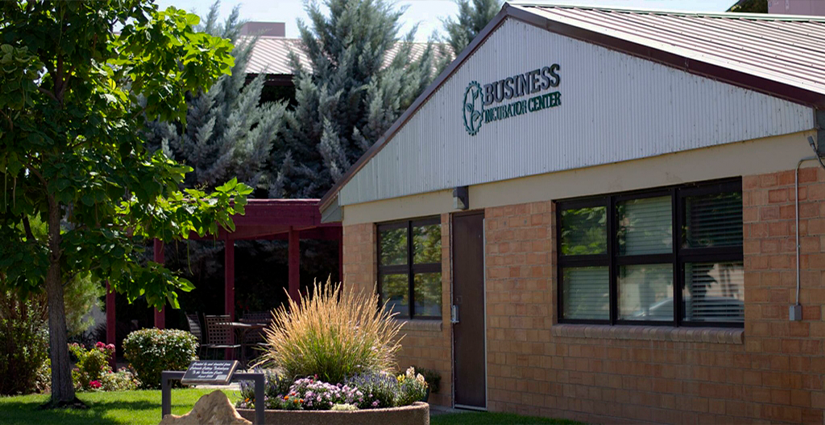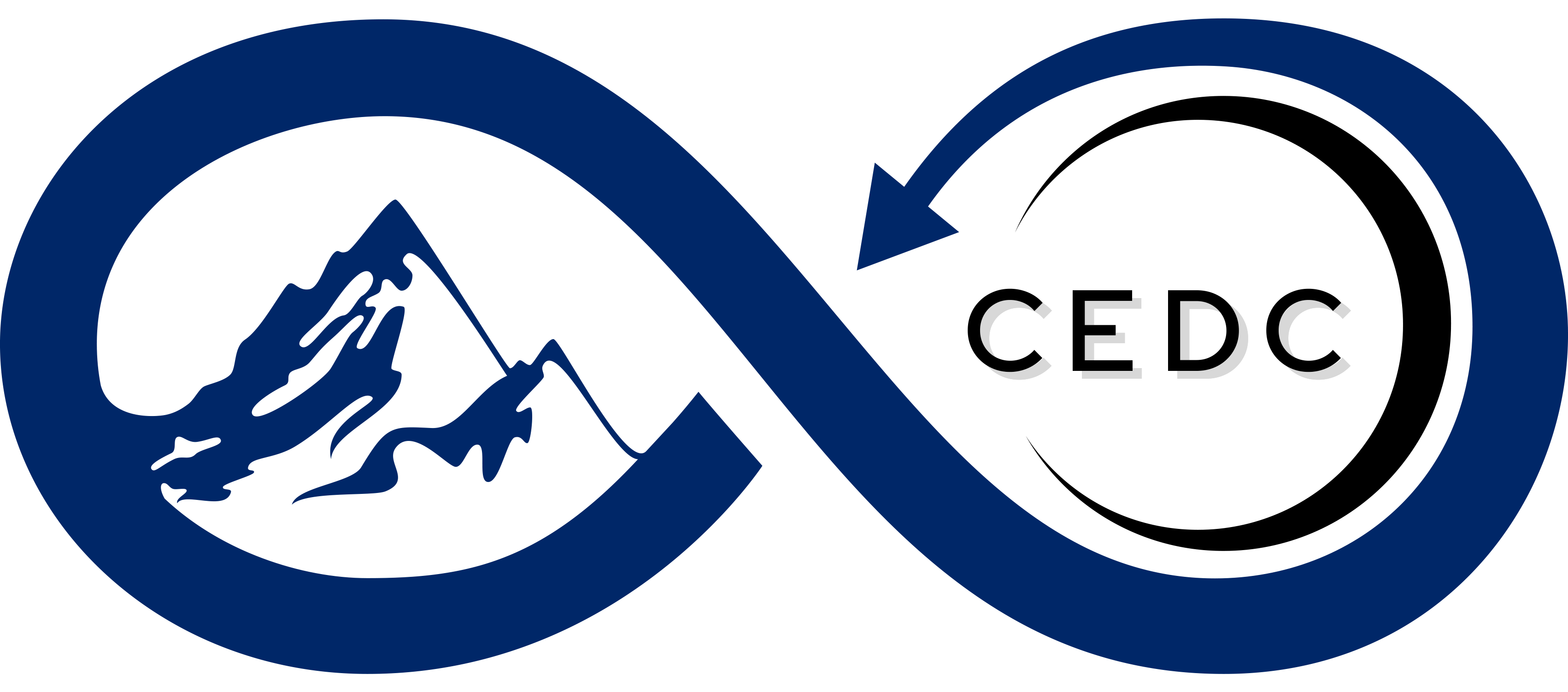Why Does Business Need Circularity?
As business leaders, we’re all part of someone else’s supply chains, and the customers we serve expect maximum efficiency and responsiveness from us.
Greenhouse Gas Emissions (GHGs)

The carbon emissions that companies release as a result of providing products and services for sale. While you may not have to report these, your clients probably do, and most are pushing net-zero emissions (70 to 80 percent of a company’s carbon footprint) down the supply chain.
Resource and material inefficiencies

Resource and material inefficiencies cost money, and circularity keeps both products and materials in highest value and circulation as long as possible.
Waste

Waste creates unnecessary cost in both tipping fees and squandered material value. Plus, trash streams like construction and demolition waste (C&D) fill landfills to overflowing with often reusable materials.
Stakeholders

Stakeholders are groups or individuals who can affect or are affected by an organization’s achieving its business objectives, and they include customers, investors, regulators, local and global communities, workers, Millennials and Gen Z and media. These groups have said material waste and pollution are no longer acceptable.
What We Do
The Circular Economy Development Center is the nucleus of circular solutions. Focused on business, the Circular Economy Development Center helps companies transform wasteful linear consumption models to circular ones through:
- Facilitating solutions to redesign and remanufacture products, resources and materials
- Co-creating new, innovative circular business models
- Offering business and economic development expertise
- Coalescing sectors to form collaborative solutions

The Circular Economy Development Center provides guidance, access to resources and technical assistance and funding (when available) to generate and support circular-economic development.
What We Provide
Stakeholders care about ESG, and creating business circularity can help address their concerns. To help Colorado companies and businesses become circular, we provide expertise, guidance, preferred vendors and technical assistance with the following tools and processes. Circularity sits under the ESG umbrella, and it engages a number of ESG initiatives, mostly but not all under the environmental pillar. The table below shows some examples of how circularity can appear as ESG value creation, yet every situation is different.
Chart credit: Big Glasses Consulting
E - Environmental
Biodiversity, habitats, aff -de/ -/reforestation
Carbon management (emissions, offsets)
Circular economics (product design, sustainability of materials)
Clean-tech opportunities
Climate change (vulnerability, business disruption)
Energy management (including supply chain)
Energy mix (including renewable energy)
Extreme weather
Finance (environmental impact)
Green building
Land use (conversion forest or wetlands, improper or excessive)
Lifecycle assessments (LCA, product footprints)
Materials flow
Raw material sourcing
Supply chain
Waste management (HAZMAT, plastic, averting tipping fees)
Water management (waste water, recycling)
S - Social
Chemical safety & quality
Community relations
Delivering safe products from safe workspaces
Environmental health & safety (EHS)
Labor management (supply chain & child labor standards, rights & relations)
Product safety & quality
Socio-economic impact
Sustainable production
G - Governance
Regulations
Regulatory visitations (lawsuits, fines, sanctions)
Strategy (innovation & investment)
 The Circular Economy Development Center can help you define what’s material for you in terms of both circularity and corporate financial performance. Like a North Star, good materiality assessments are a crucial ESG (environmental, social and governance) tool that also engages stakeholders to find out what they expect. Stakeholders can make or break a business, and we help you discover what they need in circularity.
The Circular Economy Development Center can help you define what’s material for you in terms of both circularity and corporate financial performance. Like a North Star, good materiality assessments are a crucial ESG (environmental, social and governance) tool that also engages stakeholders to find out what they expect. Stakeholders can make or break a business, and we help you discover what they need in circularity.
 The Circular Economy Development Center can help you pinpoint who and where suppliers are, what they do for a company and the impacts of their activities. Also a bedrock ESG activity, value/supply-chain mapping can be big work because it makes visible the invisible and it, too, provides information about supplier materials, resources and greenhouse gas emissions. Like a snapshot, knowing who and what is in a value/supply chain at a given time is essential to understand a product, process or service impact. We help you explore better, more circular options either with existing suppliers or with new ones.
The Circular Economy Development Center can help you pinpoint who and where suppliers are, what they do for a company and the impacts of their activities. Also a bedrock ESG activity, value/supply-chain mapping can be big work because it makes visible the invisible and it, too, provides information about supplier materials, resources and greenhouse gas emissions. Like a snapshot, knowing who and what is in a value/supply chain at a given time is essential to understand a product, process or service impact. We help you explore better, more circular options either with existing suppliers or with new ones.
 The Circular Economy Development Center helps you navigate lifecycle assessment (LCAs), tools that measure environmental impacts, including greenhouse gas emissions, over the entire lifespan of products, processes, materials and any other measurable activities. LCAs are foundational in understanding the complex systemic interactions of industrial production, allowing for meaningful comparisons and improvements. We help you interpret the minutiae in decision-useful ways.
The Circular Economy Development Center helps you navigate lifecycle assessment (LCAs), tools that measure environmental impacts, including greenhouse gas emissions, over the entire lifespan of products, processes, materials and any other measurable activities. LCAs are foundational in understanding the complex systemic interactions of industrial production, allowing for meaningful comparisons and improvements. We help you interpret the minutiae in decision-useful ways.
 The Circular Economy Development Center can help you tell your LCA story in a public-facing, meaningful way with environmental product declarations (EPDs). EPDs include relevant material impacts like greenhouse gas emissions and the global warming potential of a product or material. EPDs are quickly becoming the norm in purchasing, and some entities, including the U.S. government’s General Services Administration (GSA), require them for compliance.
The Circular Economy Development Center can help you tell your LCA story in a public-facing, meaningful way with environmental product declarations (EPDs). EPDs include relevant material impacts like greenhouse gas emissions and the global warming potential of a product or material. EPDs are quickly becoming the norm in purchasing, and some entities, including the U.S. government’s General Services Administration (GSA), require them for compliance.
 The Circular Economy Development Center has expertise in EHS compliance regulations and the application of these regulatory requirements to manufacturing and other operations. We perform a high-level assessment to identify and characterize potential EHS-related requirements, risks and risk factors, compliance strategies, etc., that can help spotlight which risks pose the greatest threat to your operations. We can also identify controls to help you reduce those risk levels.
The Circular Economy Development Center has expertise in EHS compliance regulations and the application of these regulatory requirements to manufacturing and other operations. We perform a high-level assessment to identify and characterize potential EHS-related requirements, risks and risk factors, compliance strategies, etc., that can help spotlight which risks pose the greatest threat to your operations. We can also identify controls to help you reduce those risk levels.
 The Circular Economy Development Center has expertise in business-case development for circular companies and products, sustainable organizations and ESG initiatives. Circularity, sustainability and ESG are important, yet business must create profit to survive. Fortunately, circular business and financial profitability go hand in hand. We shine the light to help you see the path.
The Circular Economy Development Center has expertise in business-case development for circular companies and products, sustainable organizations and ESG initiatives. Circularity, sustainability and ESG are important, yet business must create profit to survive. Fortunately, circular business and financial profitability go hand in hand. We shine the light to help you see the path.
Interested in Establishing or Expanding Your Own End Market Solution in Colorado?
We’re here to help! Click the link below and fill out a brief questionnaire. Our team will get in touch with you within 3 business days!
Satellite Offices
Colorado Springs
Coordinator: Alicia Archibald
Office Address (by appt only):
Sustainacenter
704 East Boulder Street
Colorado Springs, CO 80903

Grand Junction
Coordinator: Mike Ritter
Office Address:
Business Incubator Center
2591 Legacy Way
Grand Junction, CO 81503








